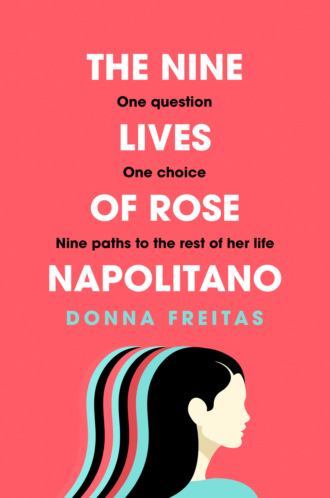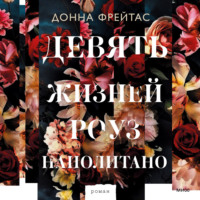
Полная версия
The Nine Lives of Rose Napolitano
A book fell from the lip of my overstuffed bag, hitting the floor with a heavy clunk.
‘Rose?’ Luke called out. ‘Is that you?’
I shut the door with a loud slam, tried to make it seem like I was just arriving. ‘Yup, I’m home! Ready for cocktails!’
‘I’ve got to go, Dad,’ he said. By the time I was one step into the living room, Luke had hung up and his phone was resting on the table.
He studied my face.
I studied his. Luke’s cheeks were red.
‘Hi.’ I tried for a happy smile, to muster the excitement that had been bubbling through me all afternoon since I’d gotten my news. I wanted those feelings back. I felt cheated, my moment ruined by Luke’s conversation with his father.
‘How much of that call did you hear?’ Luke asked.
I stopped with the false smile. ‘Enough. Too much.’
‘What do you think you heard?’
I set my bag onto a chair. ‘Don’t do that to me, Luke. I know what you guys were talking about.’
‘Tell me.’
‘It was yet another version of the conversation you keep having with your parents. That because I don’t want a baby I’m a bad, deficient woman and always will be.’
‘That is not what we were saying.’
‘Right.’
‘I also heard how my husband refuses to stand up to his parents and tell them to butt out of his marriage and stop maligning his wife!’
‘I defended you.’
‘Yeah, but why do you even need to? Why do your parents have a place in a conversation that has to do with our marriage? It’s none of their business!’
‘I’m doing my best! You know how strongly they feel and they’re my parents and I love them!’
‘Well, you know how strongly I feel and I’m your wife and I love you!’ I yanked at the scarf around my neck and tossed it onto the table.
Luke took a breath, let it out. ‘You know I love you, too.’
I kicked off my heels and they went clattering across the floor. ‘You also told your parents that I changed my mind about having a baby.’
Luke picked up the scarf and began to fold it, pressing his hand along the delicate fabric. He’d given it to me as a gift the year before and it was my favorite. He held it out to me now. ‘I was just trying to get them to back off,’ he said quietly.
I didn’t take it. Didn’t move.
‘Rose, please,’ Luke said. ‘Let’s not do this tonight. We’re supposed to be celebrating this amazing accomplishment in your life. Let’s just go out.’
My eyes turned hard, everything about me grew harder and harder. My muscles, my cells, my limbs, my cheeks especially, calcifying as I stood there looking at my husband with something like hatred. Maybe it was hatred. The first ugly seeds of it. Seeds that would grow and grow like vines until we both suffocated. ‘Somehow I don’t feel like celebrating anymore, Luke.’
‘Don’t be like that.’
‘What – a bad woman? A difficult woman? An angry woman?’
My voice, my tone, it rose until I was shrieking. What I wanted to do was stand there yelling. An endless cry of anger that would release the trapped feeling that imprisoned everything about my life. I wanted to let it out, exorcise it, but I didn’t.
Instead, I stomped off to the bedroom like a petulant child, opening and slamming closet doors and drawers as I changed from my work clothes into sweats and those thick, ugly socks that are like slippers.
Congratulations to me, I raged.
‘This is impossible,’ Luke says now, breaking our silence. ‘You’re impossible.’
I watch as he passes me on his way out of the bedroom, hear his footsteps cross the living room, bare feet pattering against wooden planks. I listen as he opens the coat closet at the front of the apartment. On his way back his steps are trailed by the sound of wheels, low and constant. A suitcase.
He passes me a second time, suitcase dragging behind him, the biggest one we own, big enough for a dead body, we’ve always joked. He stops in front of the drawers where he keeps his clothing, folded, neat, organized, so unlike my drawers, which are overflowing, pajamas and bras balled up and mixed, a cocktail of silk and satin. He hoists the suitcase onto the bed, the rich sound of the zipper circling, followed by the slide and thunk of his hands pulling out a wooden drawer, hands that I once loved all over my skin but not in a long while, hands that are lifting tall stacks of T-shirts, jeans, boxers into the open roller bag. He empties a second drawer, then a third, socks, more boxers, followed by the closet full of shirts and sweaters, until there is no room left for any more clothing, for another piece of Luke. He has taken all that he can carry.
His gaze never meets mine.
My eyes drift to the photograph of me on Luke’s bedside table. My head is thrown back, my mouth is open, and I am laughing. Snow sparkles across my thick gray sweater and throughout my dark hair – Luke had just surprised me with a snowball. He took that picture the day we got engaged. It’s his favorite photo of me.
He doesn’t touch it now, doesn’t look at it.
I think about the other photos he’s taken of me, of us, how he turned me from a person who hated having her picture taken, into one who is capable of enjoying it – well, as long as the picture is taken by him. I think about the very first time he took my photograph, how a photography session meant to last half an hour turned into an entire day spent together, a single day that extended into a lifetime of days. My rage, my anger, begins to melt.
I’d wanted a special gift for my parents for my graduation, something physical, something they could hang on the wall of the house, something that would create a conversation about my doctorate. I’d chosen Luke as the photographer because he was cheap, because he was close by my apartment. During our session, he and I got to talking. He was trying to make me relax for the camera, and eventually convinced me to tell him the real reason I started crying during our session.
So I told him.
I told Luke how, after defending my dissertation and having it bound, I’d presented my parents with a copy and they looked at it, read the title on the cover, and stopped there. How my mother said the right thing. ‘Well, Rose, congratulations on such a big accomplishment! We have a doctor in the family!’ But underneath her words, I could tell she wasn’t sure what to make of the kind of doctor I’d become. How my parents struggled to understand why I’d wanted my PhD so badly when a college degree should have been plenty, especially since my carpenter father wasn’t lucky enough to get even this. How even though my parents and I were close and even though we talked and saw each other regularly, grad school was something we didn’t much discuss. Whenever I brought up what I was studying, especially with my mother, she would listen with interest at first, but then her attention would fade and she would say something like, ‘I don’t even understand half of the words you’re using, Rose’ – embarrassment in her tone. I told Luke how much I loved my parents and how much they loved me back and how much I wanted us to connect on this thing that had become such an important part of who I am, and yet this connection had remained elusive. I wanted to bridge the distance between us, so here I was at his studio, getting pictures taken as though this would somehow erase the gap.
‘I have an idea,’ Luke said, when I arrived at the end of my story.
He took my doctoral gown and hung it up in a closet, set my cap on the chair, and asked me to take him to the university where I attended graduate school.
‘Okay,’ I said, thinking, Why not?
It was a fine afternoon, not great, a bit chilly and gray, but dry. Luke told me that clouds offered better lighting for photographs than sunlight. When we arrived on campus, I felt awkward taking him around.
‘I want you to show me everything,’ he assured me. ‘Every classroom, your favorite spot in the library, your favorite bench on the quad, the room where you defended your dissertation. I want you to give me Rose’s grand tour of her graduate experience and why she loved it so much.’
The longer we were there and the more we talked, the more I was able to forget that Luke was taking photographs. Our session lasted four hours and it turned into dinner afterward – my treat. I insisted.
There are photographs from that day of me walking down the hallway of my department, eyes glancing at the bookshelf that holds the faculty’s monographs, of me hugging my dissertation inside the room where I defended it, of me searching for books in the sociology section of the library, talking to a few of my beloved professors, and a beautiful, happy photo of me and my dissertation director. They are goofy and fun and totally me. I couldn’t even believe it when I saw them. Luke compiled the best ones into an album with an inscription that read: To my parents, with love, Rose Napolitano, PhD on the cover.
My mother and father sat down on the couch with the book perched between them. They asked me about every single photograph and I told them.
‘Sweetheart, this one is my favorite,’ my father said, pointing to the picture of me and my director. ‘Maybe we can pull this one out and I can make a frame for it, so we can hang it in the living room.’
I took Luke out to dinner a second time to thank him for his hard work, for making something so special, for helping my parents better understand who their daughter had become. And because, well, I wanted to see him again. When I explained how much my parents loved the album, how they’d asked me so many questions about graduate school, Luke nodded.
‘I’ve never been the biggest fan of portraits,’ he said. ‘I think the best photographs are the ones where we are just living and being in the places where we’re most ourselves. And you are most yourself at your university, Rose.’
I looked at Luke right then. I loved him already.
Luke puts one last pair of jeans on top of everything else and zips the bag.
‘Where are you going?’ I manage. The words are dry and dusty in my throat. My body sags, everything hunching over toward the floor, shoulders curving, neck bent.
He is staring at his suitcase, at the shine of navy-blue vinyl. ‘I can’t, Rose. I just can’t.’
‘You can’t what?’
‘I can’t stay. In this marriage.’
I straighten then, the movement sudden, knees, shoulders, the knobs of vertebrae along my spine, elbows tightening, wrists, fingers. ‘You’re leaving me over a bottle of vitamins?’
He turns to me, eyes sharp. I’ve seen this look many times in the last year. The look of righteousness, of determination, of tragedy for marrying a woman who refuses to have a child at all costs.
The cost, I see now, is him.
‘No. I’m leaving you because I want a baby and you don’t and I don’t know how to fix this.’
‘We used to understand each other,’ I say, voice hollow. Defeated. ‘You used to understand me.’
Luke swallows. Followed by a nearly imperceptible bob of his head.
He hefts the bag from the bed to the floor with a loud thud. Then he takes the handle, tips the suitcase, and wheels it past me and out of the bedroom.
I follow behind him, or I float, I’m not sure, my body, my brain, detached from each other. But I move, of this I am certain. I move as Luke moves, across the living room, past the long kitchen island we had built two years before because I love to cook, because I needed more room to chop and to prep.
Eventually Luke reaches the short hallway by the front door. He slips his feet into his shoes, reaches for the lock, turns it, a loud sharp note.
‘Bye, Rose,’ he says, his back to me, the light blue of his long-sleeved shirt the flag of surrender, signaling that this is the end. The battle over.
‘Where are you going?’ I ask one more time.
‘It doesn’t matter,’ is all he says.
Then I watch as Luke walks out of the tall metal door of our apartment and it swings closed. I hear the sound of the latch clicking shut, listen to the elevator as it rises to our floor, the slide of it opening, Luke’s footsteps entering it, the whirring of its descent to the lobby, followed by the quiet, by the unending silence. No more footsteps, no more whirring, no more suitcase wheels sliding along wooden planks and concrete hallways. This is the noise of being alone, of being left by one’s husband, of being left to one’s work. This is the sound of not being a mother, of refusing motherhood, the antinoise of my life to come. It is a long time before I am used to it.
Конец ознакомительного фрагмента.
Текст предоставлен ООО «ЛитРес».
Прочитайте эту книгу целиком, купив полную легальную версию на ЛитРес.
Безопасно оплатить книгу можно банковской картой Visa, MasterCard, Maestro, со счета мобильного телефона, с платежного терминала, в салоне МТС или Связной, через PayPal, WebMoney, Яндекс.Деньги, QIWI Кошелек, бонусными картами или другим удобным Вам способом.





